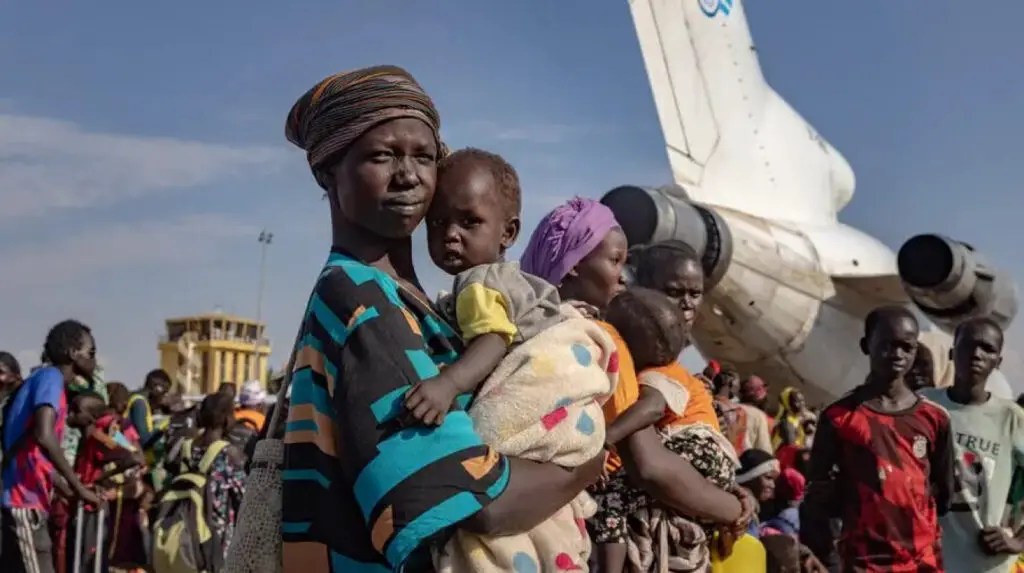- Over a decade since gaining independence, South Sudan continues to be affected by fragility, economic stagnation, and instability.
- South Sudan’s economy is clouded by production bottlenecks in the oil sector, with production dwindling in the face of limited new investment.
- The susceptibility of South Sudan to climate change and natural calamities exacerbates the nation’s economic challenges, threatening the progress of growth and development initiatives.
The Republic of South Sudan emerged as the world’s newest sovereign state and the 54th country in Africa on July 9, 2011. However, the progress of development post-independence was significantly hampered by civil war outbreaks in 2013 and 2016, which also aggravated the humanitarian crisis.
Over a decade since gaining independence, South Sudan continues to be affected by fragility, economic stagnation, and instability. Pervasive poverty is further intensified by ongoing conflict, displacement, and external shocks.
Crisis facing the oil and energy sector
Oil production is South Sudan’s primary income earner, and the economy heavily depends on oil production. The oil industry accounts for over half of GDP, 95 per cent of exports, and about 90 per cent of government revenue.
However, South Sudan’s economy is clouded by production bottlenecks in the oil sector, with production dwindling in the face of limited new investment, highlighting the need to diversify the economy. Moreover, the global slump in oil prices and political uncertainty have affected the country’s oil sector’s development.
Oil transportation has also been an issue, with most roads flooded with the tankers’ mobility hampered by extreme weather conditions.
Furthermore, since South Sudan depends on neighbouring Sudan as the only route to export oil to international markets, the conflict in Sudan poses acute downside risks to South Sudan’s macroeconomic stability amid limited fiscal resources and pressing humanitarian needs.
The country uses waterways across the Red Sea and Sudan pipelines to transport its oil. As such, the government has been unable to transport oil due to the ongoing conflict that is destroying pipelines.
Without oil exportation, South Sudan has been left vulnerable with low income and unable to feed its population or develop economically from the revenue it could have earned.
Adverse weather conditions crushing the agriculture sector
Since gaining independence in 2011, the nation has endured intense droughts and floods that have led to a significant number of deaths, displacements, and loss of livestock. These events have profoundly affected the livelihoods of its people.
The agricultural sector accounts for more than one-third of Sudan’s GDP and has suffered from the lack of funding for production inputs such as fuel, fertilizer, and seeds.
Low-income earners are struggling to even afford a single meal due to the general increase in food prices brought on by the fall in agricultural production.
Most of South Sudan’s agricultural land has been submerged by floods, leaving it as islands. There are no agricultural operations, which means poor production during harvest seasons. Low harvest means insufficient food for export or population support. This has led to slow economic growth as no trade activities occur.
Moreover, South Sudan is a country with pastoralists, and with the ongoing floods, livestock have been displaced, and others die due to lack of pasture.
The estimated annual financing gap to realize South Sudan’s climate and green growth goals from 2020 to 2030 is $9.94 billion. Significant climate adaptation and mitigation efforts are required in agriculture, livestock, and disaster risk management sectors.
The private sector encounters numerous challenges, such as insufficient infrastructure, skill shortages, limited capacity for developing bankable climate finance proposals, restricted access to capital, and elevated lending rates.
These obstacles impede the sector’s role in driving economic transformation, including funding climate initiatives and green growth. Therefore, developing policy and regulatory frameworks supporting green financing and attracting private investment and finance is crucial.
Read Also: South Africa-South Sudan ties to feature at oil and power summit
Political instability and conflicts in South Sudan
South Sudan expects to hold its first-ever election in December since gaining independence in 2011. Political rivalry between politicians is causing tension, with intercommunal clashes having surged in some parts of the country. People’s livelihoods have been disrupted by conflicts, raising living expenses.
The people backing Salva Kiir’s government and that of his primary opponent are spreading unrest in the nation, hindering business growth, depressing the country’s economy, and provoking war through protests.
Pests and diseases
As a result of water stagnation and poor sanitation in most parts of the country, waterborne diseases like malaria and hepatitis E have risen, mainly affecting children and older adults. A high mortality rate has been recorded over the past few years. The country is trying to mitigate this condition by financing the health sector without success since the government is struggling financially.
Crops and animals have been affected by pests, resulting in poor yields. Lack of pasture for livestock has resulted in death and low production of milk and meat used to sustain people. Low crop yield means no exporting farm products to international markets, thus resulting in low revenues for the government to maintain its economy.
Conclusion
South Sudan has abundant natural resources, such as oil, minerals, forests, water, land, and biodiversity. These resources, if effectively utilized, have the potential to drive economic transformation and enable diversification beyond oil and other extractive industries.
Development partners, including the Bank, should assist South Sudan in creating appropriate mechanisms to mobilize finance for regions affected by conflict or emerging from it, for instance, through security-indexed financing.
Additionally, the government is encouraged to establish a framework for natural capital accounting to facilitate investments in environmentally sustainable projects and programs.
Maintaining and speeding the peace agreement’s implementation and strengthening governance, public financial management, and service delivery institutions will be crucial as the nation strives to safeguard itself against future shocks and establish the foundation for a diverse, inclusive, and sustainable growth trajectory.
